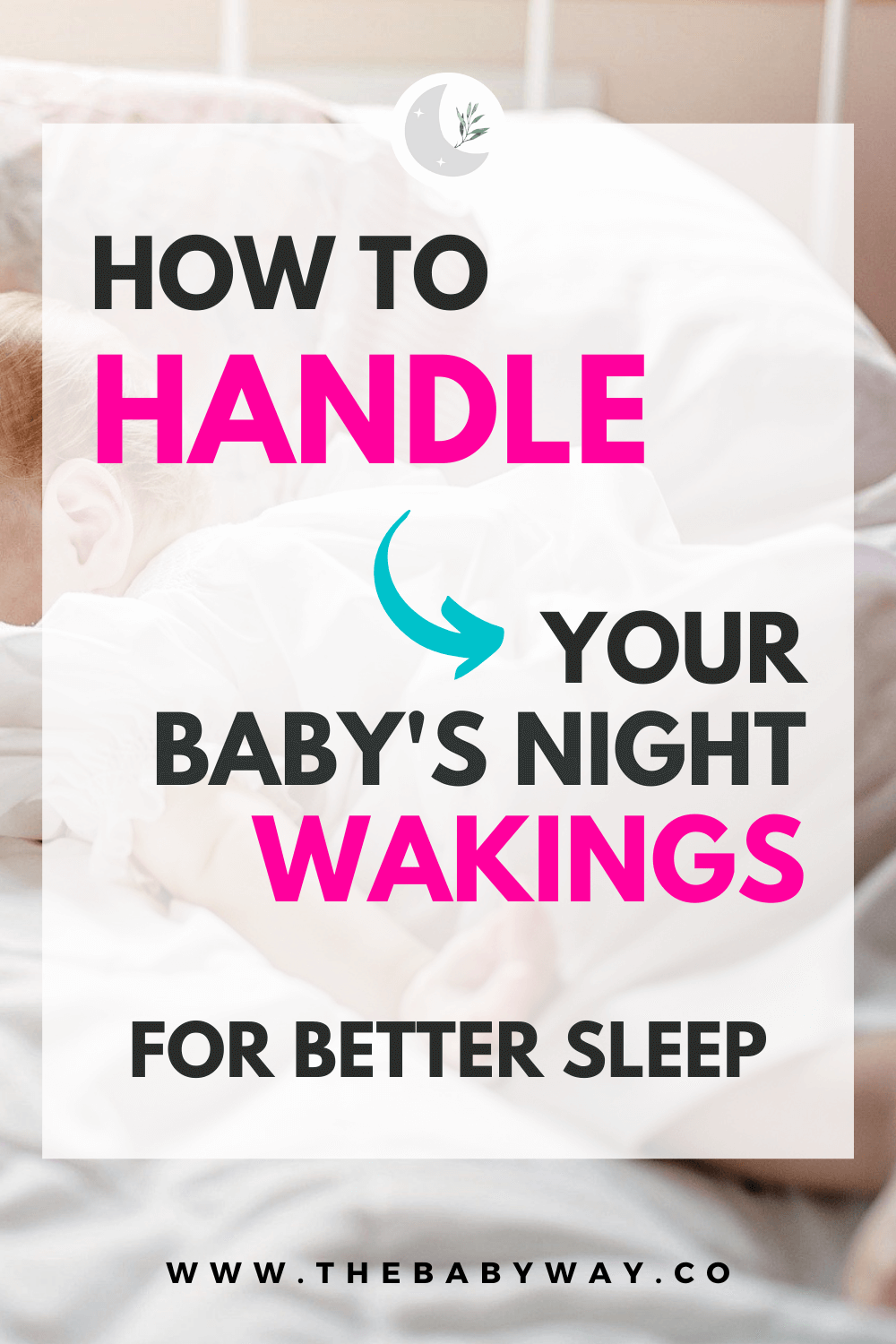Here are my 5 best tips on how to treat night wakings low-key and don't go insane
The very first thing I want you to know is:
I GET IT.
I get how exhausting it is to get up multiple times at night. I get how it leaves you puzzled because you just cannot figure out why your baby woke again. I know how frustrating it can be when the whole world seems to be sleeping but you.
SLEEP DEPRIVATION IS REAL, FOLKS!
I have been in tears. I have been angry. But it got better and passed, and now I am not anymore. So don't give up, dear mama. You will also get there.
But there is also another thing. I know that there are many people who promise you amazing results when you sleep train. I know you will read that a 6-month-old doesn't have to feed at night anymore. Society has set high standards when it comes to babies. Very high standards.
But babies don't care about society's standards. Because it is not their fault and they are not the problem.
Babies are naturally designed to wake. Night wakings are normal even though so many new parents are led to believe that they are not. They keep your baby safe. They let your baby know when they need to eat. And your baby lets you know when they need you.
So you need to wrap your head around the idea that nighttime parenting is a part of every parent's life. The more you accept it, the better you can cope.
Now, there are always measures you can undertake to improve things without using an extinction method like CIO (crying-it-out). You can check out my Sleep Program, which works with baby's natural rhythm to improve their sleep and focuses on baby-parent attachment.
Ok, before we get more sentimental, let's dive into night wakings and how to handle them, so you and baby get adequate sleep.
How Many Night Wakings Are Actually Normal?
Let's spill the beans. So what is actually normal? How often should my baby wake, and I shouldn't be concerned?
Night wakings vary from baby to baby but usually fall into a general range for different ages:
0-3 months: 3-6 night wakings
Babies this young will wake very frequently because they eat frequently. Their stomach is very small and can only hold small amounts of milk. Feedings every 1.5-2 hours are normal. At this age, infant sleep is generally very unpredictable as their circadian rhythm is still undeveloped and often all over the place.
4-6 months: 1-3 night wakings
Daytime sleep starts to decrease, and nighttime sleep accumulates. Buuuut...many babies hit their first sleep regression at 4 months. A baby that was sleeping blissfully at night might suddenly wake multiple times. And then it can often go two ways. Either it gets better, or it stays.
7-9 months: 1-3 night wakings
Even though most babies start solids at this age, their main nutritional intake still comes from milk. Frequent night wakings are still normal.
10-12 months: 0-3 night wakings
Baby sleep slowly starts to get better. Babies often stop cat napping during the day, and night sleep gets more concentrated.
13-16 months: 0-2 night wakings
Some babies start to sleep through the night at this age, but most babies still need 1-2 feedings.
16-24 months: 0-1 night waking
Yes, even at this age, a night feeding is normal. It completely depends on your baby or toddler. Your little one will not need it anymore but might still wake and demand a night feed.
Causes For Night Wakings
Even the newest parents will soon notice that there can be quite a few things that can disturb your little one's sleep. Teething, leaps, sleep regressions, gas....
Here are the most common reasons why your baby is always waking at night:
- Hunger
- Protective wakings against SIDS
- Need for comfort from their caregiver
- Over-/Undertiredness
- Discomfort from illness
- No ideal sleep environment (too bright, hot, or cold)
- Sleep regression/ developmental leap
- Sleep dependencies for older babies
- Separation anxiety
- Changes in baby's environment (start of daycare, new home)
Babies are very gentle beings. Even environmental changes such as a new sleeping space can lead to more frequent wakings at night for some time. Only because they are waking more often, it doesn't mean there is something wrong with them.
My 5 Best Tips On How To Handle Night Wakings
Now let's cover my 5 best tips on how you should handle night wakings so you and your baby can back to sleep as fast as possible.
1. Keep A Low Profile
Whenever you are feeding your baby, keep it dark and quiet and avoid unnecessary stimulation. You don't want to wake your baby too much because they will have a harder time falling back to sleep, or they will need more help to fall back to sleep. Make sure to keep minimal interaction. But you are definitely allowed to look into your baby's eyes. I will never advise a parent to avoid eye contact...because I think it's unnatural and BS. Your eyes can look at whatever they want.
2. Avoid taking your phone
Let's be honest. We are all somehow addicted to our phones. Yes, they can save us during that contact nap, and even the shortest night waking can sometimes feel veeeery long, but you really want to avoid taking that phone into your hand and start scrolling.
You should not only avoid waking your baby but also yourself. Remember how frustrating it is not to be able to sleep when your baby is sleeping? That's what's going to happen when your sleepy eyes are hit with that bright blue light. And chances are your baby will also get a fair share of blue light.
If you want to check the time, I recommend getting a simple clock with a light button.
3. Change the diaper before feeding your baby
If you have a very young baby, you will need to change their diaper during the night. Try to change your baby's diaper before you feed them. This way, you can help them fall back to sleep while nursing or feeding the bottle.
If you have an impatient baby, you can feed one side or half a bottle, change the diaper, and then feed the other side or the other half of the bottle. A crying baby will also wake up more than we want.
Diaper changes usually end by around 6 months. After that, you usually don't have to change diapers at night anymore unless they do a poo or you think they are uncomfortable.
4. Remove gas before changing the diaper
It's not uncommon that young babies experience more discomfort due to gas in the first three months. Their digestive system is still undeveloped, and they don't know how to release gas.
Even a quick tummy massage and some leg exercises can help your baby release gas at night. All it takes are about 30 seconds. Do some bicycle legs first and then slightly press their knees against their stomach. This will help release accumulated gas, and your baby can sleep better.
5. Don't overthink and control your thoughts
Ever tried a meditation where you are supposed to not think at all? It's damn hard, right? But you also know why it's recommended? Because it gives you a piece of mind.
Nowadays, we tend to overthink and overanalyze constantly. Thoughts running through our heads non-stop. But this is mentally tiring and drowning. The best thing you can do is to literally stop thinking.
Stop thinking about how your baby woke again and why you are not sleeping and how everyone else is sleeping and when you will ever sleep again and and and. Don't think anything. It's hard to do and needs practice, but it will help you better get through this phase and fall asleep much faster.
Other Things You Can Do To Improve Babys Sleep
1. Sleep schedule
After 3 months, you can slowly start with a loose schedule. It can help your baby create a more consistent and predictable sleep pattern.
2. Create healthy sleep habits
You can use a bunch of healthy sleep habits like a consistent bedtime routine to improve your baby's sleep
3. Use passive sleep associations
For me, there is no such thing as a bad sleep association. Feeding and rocking are natural things, that's why we do it instinctively the minute that little bug is handed to us.
That being said, it can also be helpful to introduce other passive sleep associations like white noise, a sleep sack, etc.
4. Watch for tired signs
Learning your baby's tired signs and putting baby to bed at the right time can help your baby sleep better at night. A baby that is overtired will wake more often due to high cortisol levels. A baby that is undertired and doesn't have built up enough sleep pressure will more easily wake due to a sleep disruption.
Will sleep training with CIO help my baby sleep through the night?
I never recommend sleep training using extinction methods. As you can see, there are a bunch of reasons your baby might wake at night. And ignoring them will not treat the cause. It will only make your baby understand that no one is going to come and see what's wrong. And often, sleep-trained babies go back to sleeping worse because the underlying cause is never really treated (yes, there are more causes than not being able to settle to sleep independently).
Remember that sleeping through the night is a developmental milestone. You can try any CIO sleep training method, but if your baby is not ready, it will be brutal. And I don't know any parent who would enjoy this.
Instead, you can use healthy sleep habits and sleep associations to get your baby used to more independent sleep. And enjoy the cuddles along the way. Believe me when I say they won't last that long.









